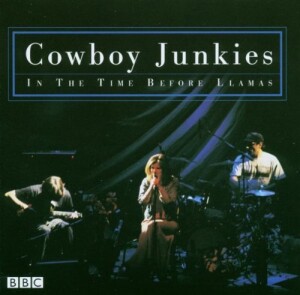 John D. Benninghouse wrote this review.
John D. Benninghouse wrote this review.
Some eleven years ago I had a college roommate who was seemingly in love with all things relating to cowboys, however loosely. I recall his nose planted in the Lonesome Dove series when he was not reading up on matters veterinary. He also listened to the Cowboy Junkies quite a bit. Now, although he helped foster my love of jazz, I have never read any Larry McMurtry nor have I approached the Cowboy Junkies – until now.
Although released less than a year ago, In the Time Before Llamas is a compilation of recordings done by the BBC in the early 1990s. (For the record, the first eleven tracks come from their performance on January 5, 1990, at The Royal Exchange Theatre, Manchester, UK. The remaining are from The Royal Albert Hall in London on June 3, 1992.) Led by Margo Timmins and her fragile, ethereal voice, the band run through a mix of covers and originals. Brothers Michael and Peter Timmins play guitar and drums, respectively, while Alan Anton fills out the rhythm section. Jeff Bird rounds out the line-up by adding mandolin, fiddle, and harmonica. Their sound is bolstered by a couple of guest musicians who add keyboards and accordion.
The band are professed Neil Young junkies and his Harvest Moon and Unplugged albums serve as good touchstones for the Junkies’ sound. So much so that I went back and listened to the former for the first time in a long while. For a few days I listened to Young and the Junkies, contrasting and comparing. I found listening to In the Time Before Llamas to be an interminably boring experience. Disturbingly, I also found that I liked Harvest Moon less. This had never happened to me before. I thought that there surely must be a scientific term for this phenomenon of dislike for one band seeping over to another that you previously liked, but I could find none. So I came up with my own: “ennui transposition.”
The band are in fine form technically. The starts and stops of Bob Dylan’s “If You Gotta Go, Go Now” are pulled off flawlessly. The slow, sad shuffle of “To Love Is To Bury” suits Timmins’ hushed voice well – but too much of the album is made with that formula, and with too little deviation. And five plus minutes of the dull “Blue Moon Revisited (A Song For Elvis)” is positively somniferous. When they did move away from the formulaic, I was left scratching my head. Robert Johnson’s “Me and the Devil” is transmogrified into sterile bit of minimalism à la Brian Eno. It’s not until the penultimate track “Murder, Tonight in the Trailer Park” that anything really interesting happens. Michael Timmins and Ken Myhr do some psychedelic freaking out on their guitars and Pete Timmins finally makes some noise on his cymbals.
The liner notes state that The Junkies were alt.country before the genre even existed and that’s true. But Neil Young did it better before The Junkies, as have many who’ve come after, such as Uncle Tupelo. Everything is safe and sanitized as if the music had been bleached. The rawness and immediacy of the musical legacies that the band invoke are nowhere to be found. The strains of genuine emotion have been leeched away making the songs the musical equivalent of Wonder Bread.
(StrangeFruit, 2003)
